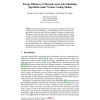Free Online Productivity Tools
i2Speak
i2Symbol
i2OCR
iTex2Img
iWeb2Print
iWeb2Shot
i2Type
iPdf2Split
iPdf2Merge
i2Bopomofo
i2Arabic
i2Style
i2Image
i2PDF
iLatex2Rtf
Sci2ools
107
click to vote
IC3
2009
2009
Energy Efficiency of Thermal-Aware Job Scheduling Algorithms under Various Cooling Models
One proposed technique to reduce energy consumption of data centers is thermal-aware job scheduling, i.e. job scheduling that relies on predictive thermal models to select among possible job schedules to minimize its energy needs. This paper investigates, using a more realistic linear cooling model, the energy savings of previously proposed thermal-aware job scheduling algorithms, which assume a less realistic model of constant cooling. The results show that the energy savings achieved are greater than the savings previously predicted. The contributions of this paper include: i) linear cooling models should be used in analysis and algorithm design, and ii) although the job scheduler must control the cooling equipment to realize most of the thermal-aware job schedule's savings, some savings can be still achieved without that control.
Related Content
| Added | 18 Feb 2011 |
| Updated | 18 Feb 2011 |
| Type | Journal |
| Year | 2009 |
| Where | IC3 |
| Authors | Georgios Varsamopoulos, Ayan Banerjee, Sandeep K. S. Gupta |
Comments (0)

